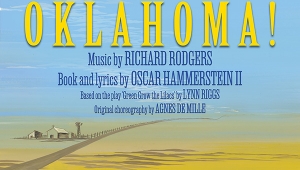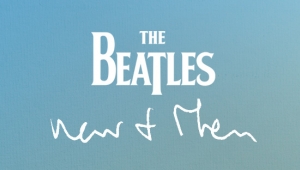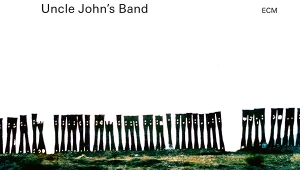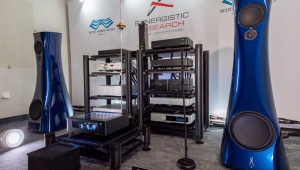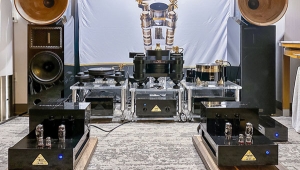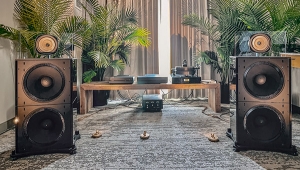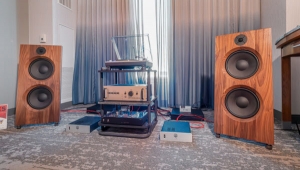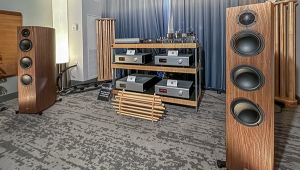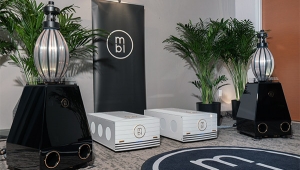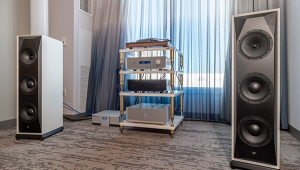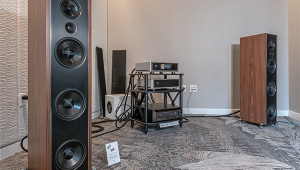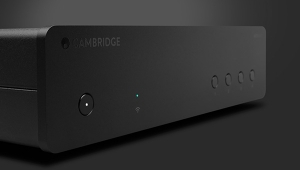| Columns Retired Columns & Blogs |
April 2024 Classical Record Reviews

Neave Trio: A Room of Her Own
Works by Chaminade, Smyth, Tailleferre, and Boulanger
Chandos CHAN 20238, CD (reviewed as 24/96). 2024. Jonathan Cooper, prod. & eng.
Performance ****½
Sonics ****½
Works by Chaminade, Smyth, Tailleferre, and Boulanger
Chandos CHAN 20238, CD (reviewed as 24/96). 2024. Jonathan Cooper, prod. & eng.
Performance ****½
Sonics ****½
Despite the preponderance of classical orchestral blockbusters overplayed at audio shows, a goodly number of us enjoy nothing more than basking in the refined beauties of smaller-scaled chamber music. If you would like to spread your wings beyond the giant guys of the literature, the Neave Trio's exploration of trios composed early in the lives of Cécile Chaminade (1857–1944), Lili Boulanger (1893–1918), Germaine Tailleferre (1892–1983), and Dame Ethel Smyth (1858–1944)—the only non-French woman of the pack—is a must.
Chaminade's Trio No.1 mixes romantic sentiments with a delicacy and beauty all their own. The andante is extremely beautiful, the presto leggiero an exuberant, darting delight, and the virtuosic piano writing is equally challenging and enrapturing.
All of Boulanger's compositions were early, alas. The sister of famed teacher Nadia Boulanger (who counted Aaron Copland, Astor Piazzolla, David Del Tredici, and Philip Glass amongst her students) suffered from ill health most of her life. While that didn't stop her from winning the Prix de Rome at age 19, she died five years later. The album's two trios by Boulanger are markedly different, the first a standout for its original voice and lively, foot-tapping chromaticism, the second distinguished by its rare beauty and profound sadness.
Tailleferre is a master at expanding lovely, simple, songlike melodies into rhapsodic journeys. In the first movement of her Trio, which she revised 61 years after it was composed, it's hard not to fall in love with the gorgeous tone violinist Anna Williams and cellist Mikhail Veselov bring to their lovely interplay. The great Smyth's early Trio in D minor packs passion, joy, lyrical beauty, and delight into delectable tunes, then ends with enough heartfelt lyricism to earn it a place in many a concert program and many a heart.—Jason Victor Serinus
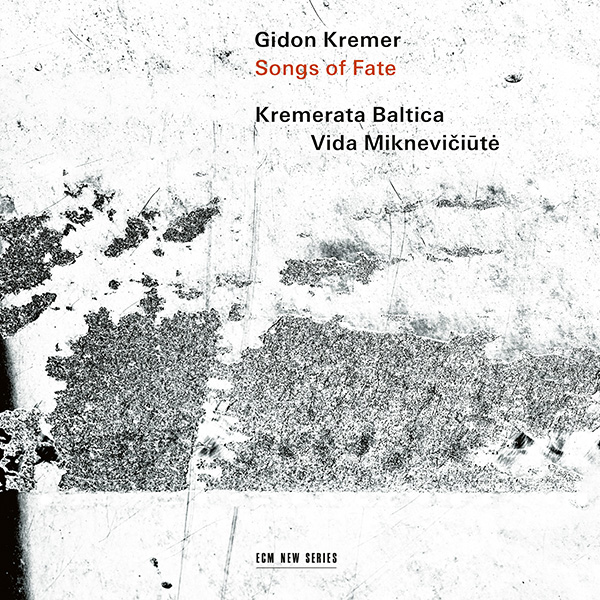
Gidon Kremer: Songs of Fate
Works by Šerkšnytė, Kuprevičius, Weinberg, and Jančevskis
Kremerata Baltica, Vida Miknevičiūtė, soprano
ECM 2745, CD (reviewed as 24/96 WAV). 2024. Manfred Eicher, prod.; Vilius Keras, Aleksandra Keriene, Peter Laenger, engs.
Performance *****
Sonics ****½
Songs of Fate takes us on an extraordinary journey of survival and pain. Far more than a "concept album," it bears urgent witness to violinist Gidon Kremer's roots as a Jew who has spent years in the Baltic states. This intimate, personal statement is intended, in Kremer's words, "to speak to everybody, reminding us of tragic fates along the way and that we each have a 'voice' that deserves to be heard and listened to."
Kremer's violin, Magdalena Ceple's cello, Andrei Pushkarev's vibraphone, and the instruments of Kremerata Baltica speak eloquently as the recently composed "This too shall pass," by Raminta Šerkšnytė, gives way to four works by Giedrius Kuprevičius. Their heart-grabbing melodies and unmistakable roots in Jewish tradition touch deeply. Vida Miknevičiūtė, a remarkably eloquent and gorgeously voiced soprano, sings "David's Lamentation" from the chamber symphony, The Star of David, and an interpretation of the sacred prayer, Kaddish, that Jews recite in memory of the dead.
Five short works by Mieczyslaw Weinberg (1919–1996), including three of his Jewish Songs for soprano and string orchestra, intensify the sense of hope, dislocation, and despair that characterize the Jewish struggle for survival over close to six millennia. Kremer has long championed Weinberg's music, which has finally received recognition. Weinberg's cradle song, "Viglid," conveys more than simple sweetness. The program concludes with "Lignum," the shockingly original, breathtaking dialogue with nature and trees by Jekabs Jančevskis (b. 1992) that thrillingly expands to huge dimensions as it speaks to nature's struggle to transcend impending catastrophe. What words cannot describe, music reveals.—Jason Victor Serinus
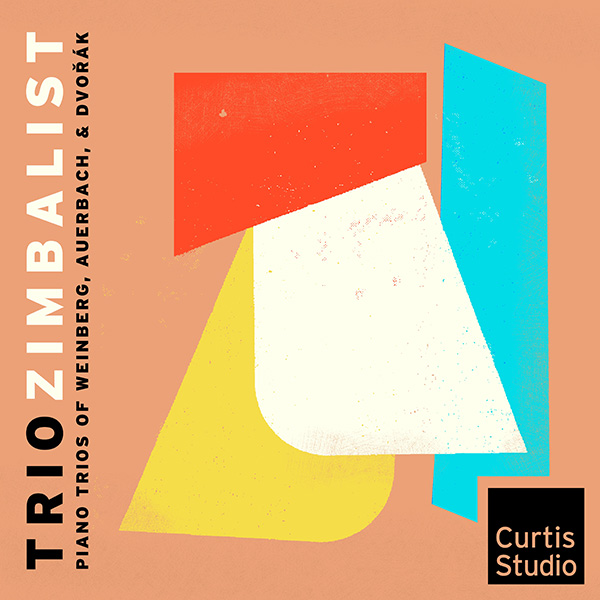
Trio Zimbalist: Piano Trios of Weinberg, Auerbach, & Dvořák
Josef Špaček, violin; Timotheos Gavriilidis-Petrin, cello; George Xiaoyuan Fu, piano
Curtis Studio PLAT21970 (WAV download). 2024. Drew Schlegel, prod. and eng.
Performance *****
Sonics *****
I understand the marketing idea, harnessing a "popular" score like the Dvořák to present newer material more demanding of audiences, as the Curtis-based Zimbalist Trio has done. The question, of course, is who will buy it? How many listeners curious about Lera Auerbach will want Dumky?
Weinberg and Auerbach share an angular aesthetic. The dissonances rarely turn abrasive; in Allegros, both composers share a penchant for moto perpetuo piano writing, Weinberg's one-handed, Auerbach's in octaves. The shadow of Shostakovich hangs powerfully over Weinberg's emotionally ambivalent, folklorish piece, though he brings in a few novelties: As the Präludium of the Präludium and Aria seems to reach a definitive close, the sustaining violin takes things in a new direction. The composer frequently juxtaposes two of his five available timbres, treating string pizzicatos as separate "instruments." The centerpiece of Auerbach's score is its Andante, launched by a plaintive, broadly singing cello theme, the piano sprinkling single notes around. The violin's lyrical entry turns bittersweet.
"Dumka" means "thoughts" in Slavic languages; each of the six Dumky sets off a ruminative section with livelier material—until the sixth reverses the order. The slow music isn't all melancholy: elegiac and wistful in the second movement, cautiously optimistic in the third, veering to piercing sorrow in the fifth.
The Zimbalists have the measure of all these scores, though a few scratchy sounds escape both string players in Auerbach's finale. They handle Dumky's tempo changes with assurance and inject a nice friskiness into some of the quicker passages. The sound is vivid, though the perspective is closer than some prefer in chamber music.—Stephen Francis Vasta
- Log in or register to post comments











